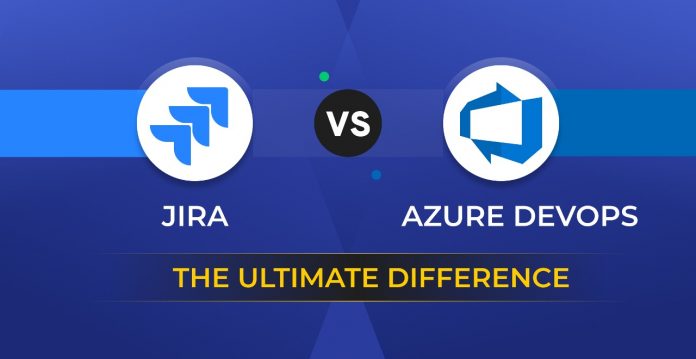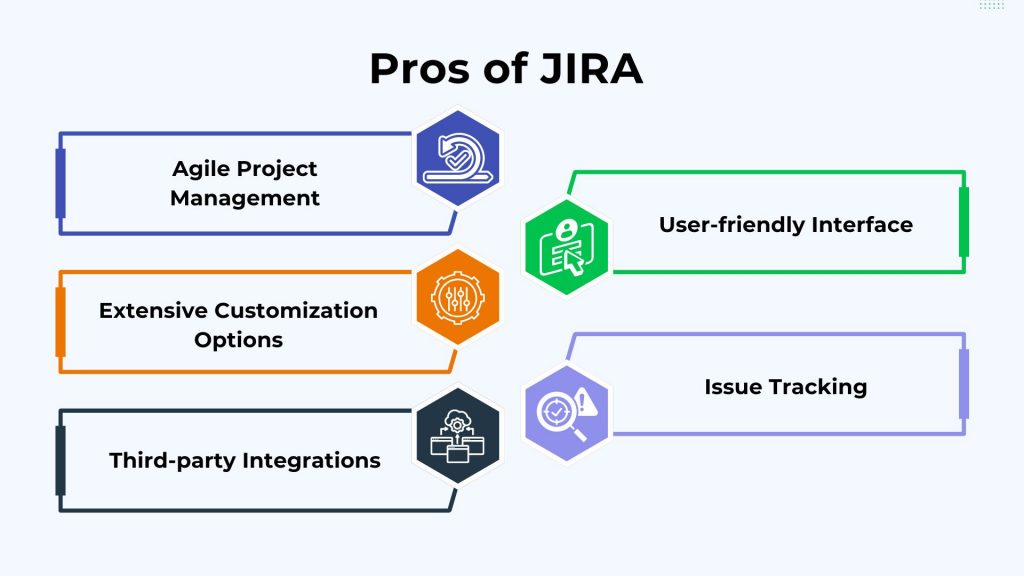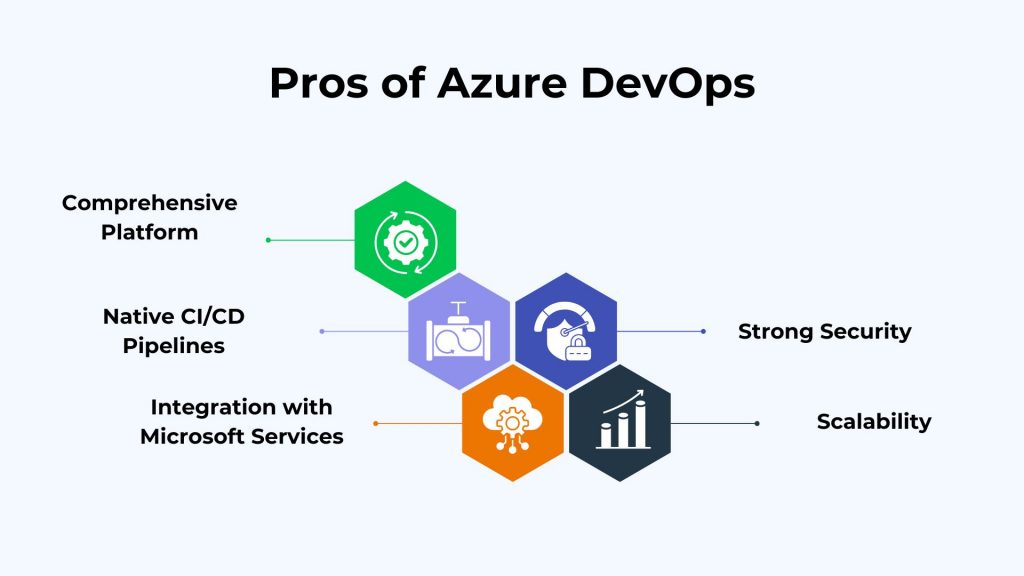
Introduction
In the ever-evolving landscape of software development, choosing the right project management and development tool is paramount for the success of any organization. Jira and Azure DevOps are two of the most popular and powerful solutions dominating the market today.
As teams strive to streamline their workflows, collaborate efficiently, and deliver high-quality software, the decision between these two platforms can significantly impact productivity, communication, and project outcomes.
Table of Contents:
- Introduction
- What is Jira?
- What is Azure DevOps?
- Azure DevOps Vs. JIRA: Understanding the Differences
- Pros and Cons of Jira Vs. Azure DevOps
- Azure DevOps Vs. JIRA: Which Tool is Best?
- Conclusion
In this blog, we will compare Jira and Azure DevOps comprehensively, dissecting their strengths, weaknesses, and unique features. By the end of this blog, you will have a clearer understanding of the key differences between these two platforms and be better equipped to determine which one can propel your team toward greater success in the dynamic world of software development.
What is Jira?
Jira is a widely-used issue tracking and project-management software developed by Atlassian. It enables software development teams to plan, track, and manage projects efficiently. Known for its flexibility and adaptability, Jira supports various methodologies like Agile, offering features such as Agile boards, sprints, and backlogs.
With extensive customization options and seamless integration with other tools, Jira is popular for organizations seeking streamlined development processes and improved collaboration.
What is Azure DevOps?
Azure DevOps is a comprehensive development platform provided by Microsoft that encompasses a suite of tools and services to support end-to-end software development. It enables development teams to efficiently manage version control, project planning, build automation, continuous integration, deployment (CI/CD), and collaboration.
With Azure DevOps, teams can host their code repositories, create and manage work items, automate build and release pipelines, and leverage powerful reporting and analytics capabilities to enhance productivity and deliver high-quality software products.
Now that we have the definitions of Jira and Azure DevOps, we will discuss Jira vs. Azure DevOps next.
Azure DevOps vs. JIRA: Understanding the Difference
As the world of project management and software development explodes with new options, two established powerhouses consistently grab attention: Jira and Azure DevOps. Choosing the right platform can be a game-changer for teams and organizations striving to optimize their development processes and streamline collaboration.
In this head-to-head comparison, we explore the strengths, capabilities, and unique features of Jira and Azure DevOps, aiming to help you make an informed decision that aligns perfectly with your team’s needs and project requirements.
1. Project Management Features
Jira:
- Issue Tracking: Jira excels in issue tracking, allowing users to create, prioritize, and manage tasks, bugs, and feature requests. It supports customizable workflows, enabling teams to tailor the issue lifecycle to their needs.
- Agile Boards and Scrum: Jira’s Agile boards facilitate Scrum processes, enabling teams to plan sprints, track progress, and manage backlogs effectively. It visually represents work items, making it easy to monitor project status in real-time.
- Kanban Boards: Jira’s Kanban boards are ideal for teams that prefer a continuous flow approach. They offer flexibility in managing work items, focusing on optimizing workflow efficiency and minimizing bottlenecks.
- Roadmaps and Versions: Jira allows teams to plan releases with roadmaps and manage project versions efficiently.
Azure DevOps:
- Work Item Tracking: Azure DevOps offers robust work item tracking capabilities, supporting various work item types like tasks, bugs, and user stories. Teams can easily define relationships between work items, providing a comprehensive view of project progress
- Backlogs and Boards: Azure DevOps provides hierarchical backlogs, allowing teams to easily organize and prioritize work items. Agile boards can be customized to reflect different team processes
- Portfolio Management: Azure DevOps provides portfolio management features, enabling organizations to manage multiple projects and track progress at a higher level.
2. Version Control and Code Management
Jira:
- While Jira is not a version control system, it integrates well with popular version control tools like Git and Subversion. Developers can link Jira issues to code commits, facilitating traceability between code changes and work items.
Azure DevOps:
- Git Repositories: Azure DevOps offers native support for Git repositories, providing distributed version control for code management. Teams can collaborate on code changes efficiently using Git branches and pull requests.
- TFVC (Team Foundation Version Control): Azure DevOps also supports TFVC, a centralized version control system suitable for teams with specific version control requirements.
3. Continuous Integration and Continuous Deployment (CI/CD)
Jira:
- Jira provides CI/CD integration through third-party plugins at the Atlassian Marketplace. These plugins allow integration with CI/CD tools like Jenkins or Bamboo, enabling teams to automate build and deployment processes.
Azure DevOps:
- Azure DevOps offers built-in CI/CD pipelines that allow teams to automate the entire build, test, and release process. The pipelines support a wide range of technologies and platforms, making it easy to set up end-to-end automation.
4. Integration and Extensibility
Jira:
- Jira has a vibrant ecosystem with numerous third-party integrations in the Atlassian Marketplace. These integrations cover various tools and services, allowing teams to customize their Jira instance per their needs.
Azure DevOps:
- Azure DevOps offers extensive integration options with other Microsoft services and third-party tools. Additionally, it has a rich set of extensions available in the Azure DevOps Marketplace, providing additional functionalities and integrations.
5. Pricing and Licensing
Jira:
- Jira offers various pricing models, including self-hosted and cloud-based options. The pricing is typically based on the number of users and the edition of Jira (e.g., Jira Software, Jira Service Management).
Azure DevOps:
- Azure DevOps offers free and paid plans with different features and capabilities. The pricing may vary based on the number of users and the usage of additional services like build minutes in CI/CD pipelines.
6. User Interface and User Experience
Jira:
- Jira’s user interface is known for its simplicity and ease of use. The UI is intuitive, and the navigation is straightforward, making it easy for users to adapt quickly.
Azure DevOps:
- Azure DevOps provides a clean and modern user interface consistent with other Microsoft products. It is well-organized and provides a seamless experience across different tools within the platform.
7. Security and Permissions
Jira:
- Jira offers strong security features, allowing administrators to define granular permissions for different user roles. It controls who can access, create, edit, and delete issues and other project artifacts.
Azure DevOps:
- Azure DevOps integrates with Azure Active Directory, providing enterprise-grade security features. Administrators can manage access control through Azure AD, ensuring secure access to the platform.
8. Support and Community:
Jira:
- Jira has an extensive knowledge base, official documentation, and community forums where users can seek help and share experiences.
Azure DevOps:
- Azure DevOps benefits from Microsoft’s strong support infrastructure, including documentation, forums, and direct support channels for paid plans.
Here’s a tabular format for the comprehensive comparison between Jira and Azure DevOps:
| Aspect | Jira | Azure DevOps |
| Type | Issue tracking and project management tool | Comprehensive development platform |
| Comprehensive development platform | Agile boards (Scrum and Kanban), customizable workflows | Work item tracking, backlogs, portfolio management |
| Version Control | Integration with Git, Subversion, and other systems | Native support for Git repositories, TFVC |
| CI/CD Automation | Requires third-party plugins for integration | Built-in CI/CD pipelines, seamless integration |
| Integration & Extensibility | Rich Atlassian Marketplace with many plugins | Azure DevOps Marketplace with extensions |
| Pricing & Licensing | Various pricing models based on users and edition | Free and paid plans based on users and usage |
| User Interface & UX | Intuitive and user-friendly interface | Clean and modern interface consistent with MS products |
| Security & Permissions | Robust security features with granular permissions | Integrated with Azure Active Directory for secure access |
| Support & Community | Extensive knowledge base and community resources | Backed by Microsoft’s support and documentation |
| Use Cases & Recommendations | Suitable for Agile teams and various workflows | Ideal for Microsoft-centric development environments |
Pros and Cons of Jira Vs. Azure DevOps
Jira and Azure DevOps are both powerful tools in the realm of project management and software development. In this analysis, we explore the pros and cons of each platform, providing insights to aid in your decision-making process.
Pros and Cons of Jira
Pros
- Agile Project Management: Jira excels in Agile project management, offering features like Scrum and Kanban boards, backlogs, and burndown charts, making it an ideal choice for teams following Agile methodologies
- Customization: Jira provides extensive customization options, allowing teams to tailor workflows, issue types, and fields to match their specific processes and requirements
- Third-party Integrations: Jira has a rich ecosystem of third-party plugins available in the Atlassian Marketplace, enabling seamless integration with other development tools and services
- User-friendly Interface: Jira’s intuitive and user-friendly interface makes it easy for team members to adapt quickly and collaborate effectively
- Issue Tracking: Jira’s robust issue-tracking capabilities help teams efficiently manage and prioritize tasks, bugs, and feature requests.
Cons:
- Cost: Depending on the number of users and features required, Jira’s pricing can be a significant consideration for smaller teams or organizations on a tight budget.
- Learning Curve: While Jira’s interface is user-friendly, the extensive customization options may result in a steeper learning curve for some users.
- CI/CD Integration: Jira’s built-in CI/CD capabilities are limited compared to Azure DevOps, requiring third-party plugins for full CI/CD automation.
Pros and Cons of Azure DevOps:
Pros
- Comprehensive Platform: Azure DevOps provides an all-encompassing platform that covers version control, project management, CI/CD pipelines, reporting, and analytics, offering a seamless end-to-end development experience
- Native CI/CD Pipelines: Azure DevOps comes with built-in, powerful CI/CD pipelines, allowing teams to automate the build, test, and deployment processes efficiently
- Integration with Microsoft Services: Azure DevOps integrates seamlessly with other Microsoft services, such as Azure cloud services and Active Directory, providing a cohesive ecosystem for Microsoft-centric development environments
- Robust Security: Leveraging Azure Active Directory, Azure DevOps ensures enterprise-grade security measures for data protection and access control
- Scalability: Azure DevOps can easily scale to accommodate projects of any size, making it suitable for both small teams and large enterprises
Cons:
- Limited Agile Features: While Azure DevOps supports Agile methodologies, its Agile boards and features may not be as robust as Jira’s dedicated Agile project management capabilities
- Limited Third-party Integrations: While Azure DevOps offers some extensions in the Azure DevOps Marketplace, the selection of third-party integrations may not be as extensive as Jira’s Atlassian Marketplace
- Interface Familiarity: For teams unfamiliar with the Microsoft ecosystem, the interface and user experience may take some time to get accustomed to
Master the most in-demand Project Management tool with Invensis Learning’s industry aligned JIRA Certification Training!
Jira Vs. Azure DevOps: Which Tool is Best?
Selecting the best tool between Jira and Azure DevOps is crucial for optimizing software development processes and collaboration. Jira, from Atlassian, excels in Agile project management and offers extensive customization options, making it ideal for Agile teams seeking adaptability.
On the other hand, Azure DevOps, provided by Microsoft, offers an all-in-one development platform with native CI/CD automation and strong integration with Microsoft services, making it attractive for teams aligned with the Microsoft ecosystem.
The decision between Jira and Azure DevOps ultimately depends on your team’s workflows, development methodologies, and preferences. Jira may be the best fit if you prioritize Agile project management and customization.
However, if you require an all-in-one platform with native CI/CD automation and a Microsoft-centric environment, Azure DevOps could be the optimal choice.
Consider your team’s specific needs, project requirements, and long-term scalability when making this crucial decision. Whichever tool you choose, embracing its capabilities and maximizing its potential will undoubtedly enhance your software development journey and propel your team toward greater efficiency and success.
Conclusion
The comparison between Jira and Azure DevOps has shed light on their unique strengths and capabilities as project management and development tools. While Jira excels in its flexibility, ease of use, and extensive customization options, Azure DevOps stands out with its seamless integration with Microsoft’s development ecosystem and robust version control features.
The choice between these two platforms ultimately depends on each software development team’s specific needs and objectives.
Interested to know more about software development and project management? Look no further! Take your career to new heights by obtaining certifications in two of the most powerful tools in software development – JIRA Certification and DevOps Certification. These certifications showcase your proficiency in these tools and demonstrate your commitment to delivering high-quality projects efficiently.
Join us as we explore the incredible opportunities that JIRA and DevOps certification can unlock for your professional growth.
















